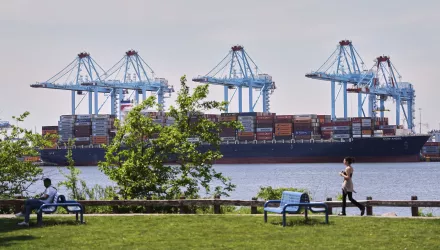After two decades of intensive fishing in New England, the groundfish fishery has essentially collapsed. We're not alone; around the world, 25 percent of fisheries have been brought to the brink by overfishing. Yet earlier this month, US District Judge Gladys Kessler issued a one-year delay of restrictions on commercial fishing in New England waters, at the
request of the New England Fishery Management Council. Something needs to be done. But the obvious answer - simple restrictions - is wrong. We can do better.
The cause of this decimation of fish stocks is well known: These fisheries are ''open-access'' - small fishermen and large corporations alike can fish all they want. They're no more (or less) greedy than the rest of us. The problem is that because no one owns the fish stocks in the open ocean, everyone races to take as much as possible.
Each fisherman receives the full benefit from aggressive fishing (a larger catch), but doesn't pay all the cost (an imperiled fishery for everyone). One fisherman's choices have an effect on other fishermen (of this generation and the next), but in an open-access fishery - unlike a privately held copper mine, for example - these impacts are not taken into account. Individual rationality sums to collective foolishness as the shared resource is overexploited.
Economists have long labeled this the ''tragedy of the commons.'' What to do?
Government intervention is, alas, required. Fishermen don't welcome such regulation in their economic sphere any more than anyone else. And they have a point. Conventional regulatory approaches haven't worked. They drive up costs, but don't solve the ultimate problem. And we know why. If
the government limits the season, fishermen put out more boats. If the government limits net size, fishermen buy more costly sonar. So the result of conventional regulatory approaches is to drive up costs for fishermen
(in what economists call overcapitalization) without solving the ultimate problem of declining stocks.
The answer is to adopt in the fisheries management realm the same type of innovative policy we've been using for a decade in the pollution realm - tradable permits, called Individual Transferable Quotas. Fifteen other nations - including some with economies much more dependent than ours on fishing - have adopted such systems with great success. For example,
New Zealand regulates virtually its entire commercial fishery with such a system. It has had the system in place since 1986, and it has been a great success, limiting fishing, restoring stocks to sustainable levels, and increasing fishermen's profitability.
To set up a transferable quota system for New England fisheries, the first step would be to establish a total allowable catch and allocate shares of the total limit to fishermen in individual quotas. Setting the individual quotas will not be easy. The guiding principle should be pragmatism - using the allocations to garner support for the system among fishermen
and others. If the quotas are made transferable, the problem of overcapitalization is avoided.
Studies have found that these systems tend to improve safety by reducing incentives for fishermen to go out (or stay out) when weather conditions are dangerous. Further, because a quota system tends to strengthen the fishing season, the supplies available to consumers improve in quality.
There are several transferable quota systems already in operation in the United States, including for Alaska's Pacific halibut and Virginia's striped-bass fisheries. The time is ripe for the adoption in New England, because a short-sighted congressionally imposed ban on the establishment of new quota systems in the United States has just expired.
No federal legislation is necessary, just sensible regional action.
A decade ago, environmental advocates - led by Environmental Defense - played a crucial role in the adoption of the sulfur dioxide allowance trading program that has cut acid rain by half and saved electricity generators and rate-payers nearly $1 billion annually, compared to conventional
approaches. Now is the time for environmentalists to join forces with progressive voices in the fishing industry and government regulators to set up a system in New England that can protect the livelihood of fishermen and move our fisheries onto a sustainable path.
Stavins, Robert N. “A Better Way to Regulate Fishing.” The Boston Globe, December 2, 2002





